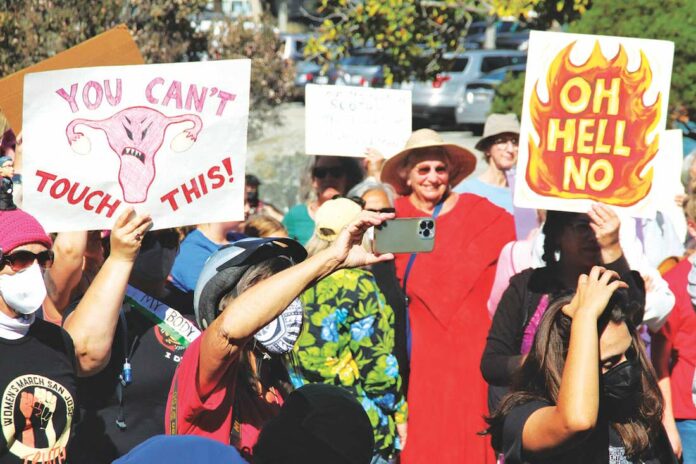
As the news broke on June 24 that the Supreme Court had overturned Roe v. Wade, local healthcare activists and politicians reflected the general sentiment that reverberated across Santa Clara County: anger, sadness and shock. But in the midst of the emotional turmoil, local and state leaders say they have a plan.
For many, the Supreme Court’s decision is upsetting, even as it has been widely anticipated. In May, the court’s draft decision to overturn the ruling was leaked, spurring protests across the country. Activists and clinics like Planned Parenthood had been ramping up services in anticipation of the overturn for years.
California and other states that plan to defend a person’s right to choose have also been preparing for this moment. Abortion will remain legal in California, but the court’s decision is expected to lead to full or partial abortion bans in more than half of the states in the U.S.
Gov. Gavin Newsom announced plans to make California a sanctuary state in May and on June 24 announced that he will be joining forces with the governors of Oregon and Washington to form a “multi-state commitment” to protecting abortion access for out-of-state patients.
That could mean an additional 1.4 million out-of-state patients will come to California for abortion procedures—an increase of almost 3,000%, according to the Guttmacher Institute.
But clinics say they are ready for this.
According to Planned Parenthood Mar Monte Chief of Staff Andrew Adams, the organization doubled its number of patients between July 2021 and April 15 from the same period the previous year, as states took aim at abortion access.
Many of these patients, he adds, came from Texas after that state passed Senate Bill 8 in 2021, which outlaws abortions after a fetal heartbeat can be detected, typically after six weeks.
“We’ve been doing a tremendous amount of work to assure that we can not only continue to provide abortion care to the people who live in the communities where we operate, but that we can also absorb those patients who will need to travel to California because they can’t get abortion care where they live now,” Adams said. “In California, we are a bastion of hope right now. We’re very lucky that the right to abortion is protected by our constitution.”
In 2020, roughly 7,000 patients from out of state were treated at Planned Parenthood health centers in California. Adams explains that the right to abortion in California could be further enshrined later this year with Senate Constitutional Amendment 10, which would strengthen a woman’s right to an abortion. This comes after the state legislature passed the amendment ahead of the June 30 deadline. Now, it’s in the hands of California voters, who will decide on the issue in the Nov. 8 election.
If Republicans take control of the House and Senate and the presidency in upcoming elections, they could pass a national abortion ban, which would supersede state laws.
In the meantime, however, providers will continue their work.
“We’re focused on making sure that people know that here in California, abortion is still safe and legal, that our doors are open, and we are seeing patients whenever they need care,” Adams said.
In making the ruling, the Supreme Court was considering a law in Mississippi that bans nearly all abortions after 15 weeks. That case—Dobbs Vs. Jackson Women’s Health—was thrown into further controversy last month when the draft opinion was leaked indicating the Court’s intention to overturn Roe.
Writing for the majority, Justice Samuel Alito called Roe “egregiously wrong from the start.”
“Its reasoning was exceptionally weak, and the decision has had damaging consequences,” Alito wrote. “And far from bringing about a national settlement of the abortion issue, Roe and Casey have enflamed debate and deepened division. It is time to heed the Constitution and return the issue of abortion to the people’s elected representatives.”
The opinion further stated that “the Constitution does not confer a right to abortion; Roe and Casey are overruled, and the authority to regulate abortion is returned to the people and their elected representatives.”
Alito stated that the decision covers only abortion and no other right.
“Nothing in this opinion should be understood to cast doubt on precedents that do not concern abortion,” Alito wrote.
But Justice Clarence Thomas suggested a different opinion, stating that the court should revisit the previous decisions.
“We should reconsider all of this Court’s substantive due process precedents, including Griswold [right to contraception], Lawrence [decriminalization of same-gender sex] and Obergefell [right to same-gender marriage],” Thomas wrote. “Because any substantive due process decision is ‘demonstrably erroneous.’”
Hours after the ruling, Santa Clara County’s elected and health officials responded.
Paul Lorenz, CEO of Santa Clara Valley Medical Center, said the county will continue to provide access to abortion and “all other comprehensive reproductive care for our patients.”
“When access to these services is limited or denied elsewhere in the country, we expect to see people traveling to our community to access the care they need,” he said. “The county and our taxpayers will face the costs of other states denying people access to basic healthcare. Regardless, the county will continue to help any person seeking reproductive services because abortion is a human right, and nobody should be fearful to access the care they need.”
Supervisor Mike Wasserman said he was “very disappointed in today’s ruling.”
“I believe the Court has overreached in its decision to limit women’s reproductive freedom and restrict privacy rights,” he said.
Gilroy City Councilmember Zach Hilton said the “decision does not eliminate abortions, but returns them to the dark ages where it only makes them more dangerous, especially for the poor and marginalized.”
“California will remain a safe haven for those that are forced to leave their homes and seek reproductive healthcare,” he said.














